Carmen Blu-ray Movie
HomeCarmen Blu-ray Movie 
Olive Films | 1984 | 155 min | Not rated | Aug 30, 2011Movie rating
7.3 | / 10 |
Blu-ray rating
| Users | 2.0 | |
| Reviewer | 3.5 | |
| Overall | 3.2 |
Overview
Carmen (1984)
A film version of the famous Bizet opera, where a soldier (Don José) falls in love with a beautiful factory worker (Carmen) and abandons his career post for her, but finds her affections are changeable.
Starring: Julia Migenes, Plácido Domingo, Ruggero Raimondi, Jean-Philippe Lafont, Julien GuiomarDirector: Francesco Rosi
| Music | Uncertain |
| Erotic | Uncertain |
| Romance | Uncertain |
| Drama | Uncertain |
Specifications
Video
Video codec: MPEG-4 AVC
Video resolution: 1080p
Aspect ratio: 1.66:1
Original aspect ratio: 1.66:1
Audio
French: LPCM 2.0
Subtitles
English
Discs
25GB Blu-ray Disc
Single disc (1 BD)
Playback
Region A (B, C untested)
Review
Rating summary
| Movie | 4.0 | |
| Video | 3.0 | |
| Audio | 4.0 | |
| Extras | 0.0 | |
| Overall | 3.5 |
Carmen Blu-ray Movie Review
Olé!
Reviewed by Jeffrey Kauffman October 17, 2011Can there be such a thing as too much verismo? This term, which is most appropriately used to describe a literary movement but which has been appropriated whole scale (no pun intended) into the world of opera, is typically utilized to describe the supposedly “ultra-real” world of such iconic fare as Pietro Mascagni’s Cavalleria Rusticana, a piece whose very title refers to its “rustic” everyday subject matter. But many aficionados actually point to Georges Bizet’s Carmen, an opera which predates Cav by around fifteen years more or less, as one of the progenitors of the operatic verismo movement. This is not a piece filled with, say, Greek Gods or even remote princes and princesses, but is instead a “blue collar” opera of working people, including women who ply the world’s oldest profession. But as Francesco Rosi’s rousing 1984 film version of Bizet’s legendary piece gets underway, verismo attains a new level of meaning, for the viewer is thrust headlong into what certainly appears to be an actual bullfight, replete with the hapless beast bleeding profusely and ultimately meeting its sad demise. It’s a fantastic way to introduce the opera’s dashing bullfighter Escamillo (Ruggero Raimondi), but it is also an extremely disturbing display that seems far removed from the glamorous (some might even argue glitzy) sonic world of Bizet, a composer who didn’t meet with much success other than Carmen during his relatively short life, and whose oeuvre has been subsequently frequently dismissed as tuneful and colorful but not especially deep or meaningful. Carmen in its original form actually wasn’t a traditional opera; it much more closely resembled our modern idea of a dramatic musical, with spoken dialogue instead of the more traditional operatic recitatives. After Bizet’s death, the opera was altered (those doing the altering of course insisting that their efforts were “improvements”) to more closely resemble the through sung world of grand opera. Rosi’s film reverts more or less to the original version, which helps give the film probably more accessibility to modern audiences. Operatic films have not been very successful, and even the Americanized version of Carmen, the Oscar Hammerstein lyricized version Carmen Jones, was a notorious flop when its film version with a smoldering Dorothy Dandridge and Harry Belafonte (directed by Otto Preminger) was released in 1954. Interestingly, the early 1980s saw a glut of various Carmen adaptations, including Carlos Suara’s really interesting flamenco version as well as the very loosely linked Jean-Luc Godard film First Name: Carmen (Prénom: Carmen) and the Peter Brook film based on his Reader's Digest paring down of the original opera, The Tragedy of Carmen (La Tragédie de Carmen), but for the “real thing” (to get back to verismo), Rosi’s version is undoubtedly the closest to Bizet’s original conception.
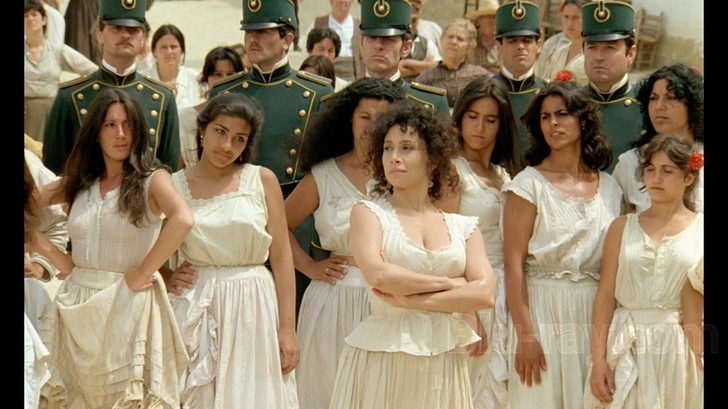
Carmen’s innate passion and fairly overt sexuality require a lead actress-singer of unusual abilities, and the good news is that this Carmen has Julia Migenes (billed, as she sometimes was in her early career, as Julie Migens- Johnson). Migenes has never really entered the highest echelon of operatic mezzos, and has in fact made as much of an impact in traditional musical theater as in the grander world of through sung spectacle. For those who would like to hear Migenes in a more traditional musical theater setting, I highly recommend her lovely work preserved on CD of the flop musical Rags (which originally starred Teresa Stratas in its very short Broadway run), the only collaboration between composer Charles (Annie, Bye Bye Birdie) Strouse and lyricist Stephen (Wicked, Godspell, and countless Disney films) Schwartz. Migenes may not be the most vocally adept Carmen ever, but she more than makes up for that with a flagrant, earthy sexuality that virtually oozes from the screen. This is a Carmen whose allure is all too evident, and therefore her mesmerizing effect on Don José (Placido Domingo).
Bizet is rarely if ever accused of being overly subtle (there’s a reason those melodies have inculcated themselves into the collective unconscious), but Rosi manages to deliver at the very least some nuance and a fair amount of irony. The opening, extremely gruesome footage of the poor bull meeting its hideous demise is obviously a metaphor, but perhaps not in the way one might initially think it is. Just as the bullfighter hypnotizes the bull with his red cape, Carmen hypnotizes Don José with her feminine wiles, and while it can’t be denied that leads to José’s professional ruin, it is of course Carmen herself who is ultimately the victim of the greater tragedy. The dance between the supposed victim and ostensible victimizer has never been more viscerally explored than it is by Rosi in this wonderfully realized film.
Rosi does an admirable job in toeing a line between opening up the opera, which most film directors would have done with abandon, and preserving the intimate relationships between the lead trio. While Rosi presents some luscious Andalusian locations throughout the film, there’s never the feeling that the opera has been broadened beyond the scope its material can handle. The film still maintains an up close and personal scale which only heightens the developing tragedy. This Carmen is incredibly picturesque, but with Domingo in incredibly fine voice, this is also a riveting emotional experience. The final showdown between José and Carmen is stunningly handled, and the dust and death of the abandoned bullring virtually wafts through the screen to reach out and touch the viewer.
Carmen Blu-ray Movie, Video Quality 
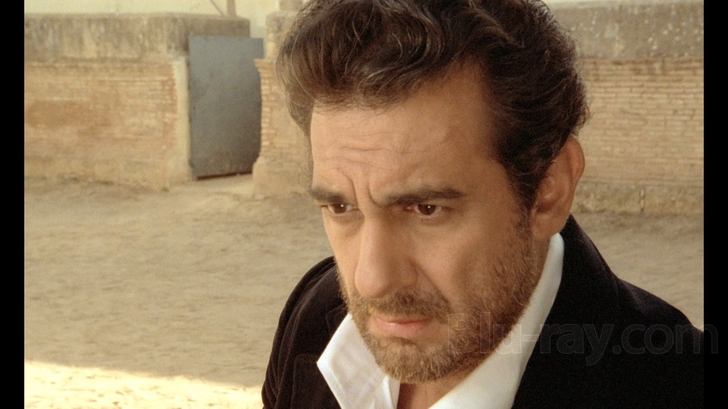
Carmen is presented on Blu-ray with an AVC encoded 1080p transfer in 1.66:1. Rosi and his cinematographer Pasqualino de Santis evoke a kind of dusty, amber yellow environment which is beautifully rendered in this high definition outing, at least for the most part. Colors are decently if not overwhelmingly robust and well saturated, though I personally wished they had popped a bit more (especially with regard to some of the reds and oranges), but the overall image tends to be on the soft side much of the time. There's an overabundance of grain in many sequences, which may put off some viewers. There's some beautiful depth of field in some of the wider vistas, and some evocative use of deep focus when Rosi has one of the leads in the forefront with ancillary action happening in the background. The transfer maintains a suitably filmic look, and the print, while not damage free, is in very good to excellent shape. There are some very minor artifacts, including a tendency toward digital noise a couple of times and some very transitory aliasing.
Carmen Blu-ray Movie, Audio Quality 
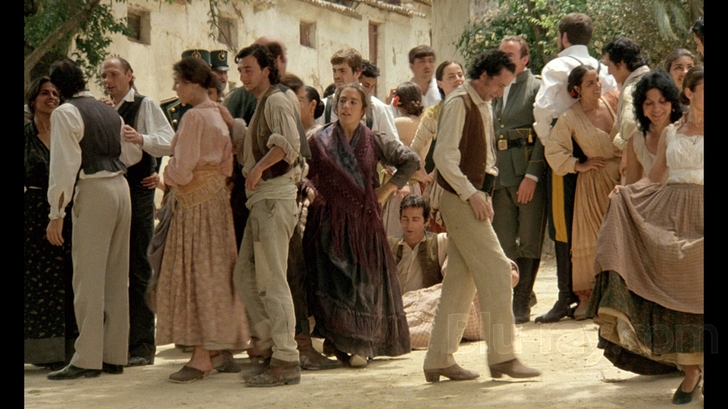
While the UK release of Carmen on Blu-ray evidently featured a lossless 5.1 track, this release sports only an LPCM 2.0 track in the original French language. While there's nothing horribly wrong with the track, it is hampered by its narrowness, something that tends to sonically cram too much information into too small of a sound space. While fidelity is very strong, the stereo mix feels somewhat cramped, especially when Bizet's resplendent orchestrations are in a head to head battle with ensemble singing. The leads all sound fantastic, and overall the solo voices are extremely well prioritized with regard to both the orchestra and the ensemble. Lorin Maazel conducts the National Orchestra of France, and the playing is flashy and spectacular, as befits Bizet's innate sensibility.
Carmen Blu-ray Movie, Special Features and Extras 
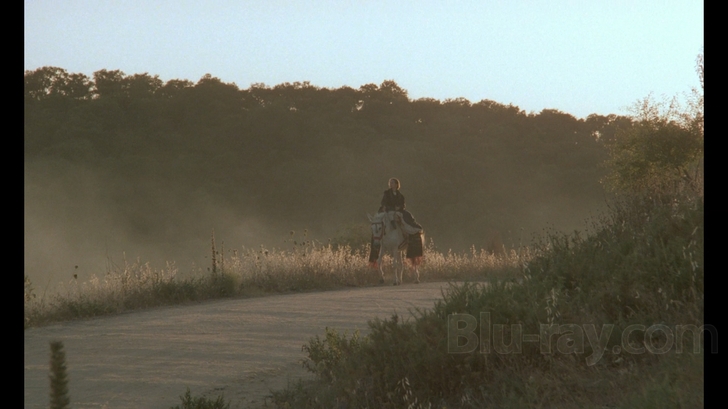
Unfortunately this Olive Films release does not include any of the supplements included in the UK release of Carmen.
Carmen Blu-ray Movie, Overall Score and Recommendation 
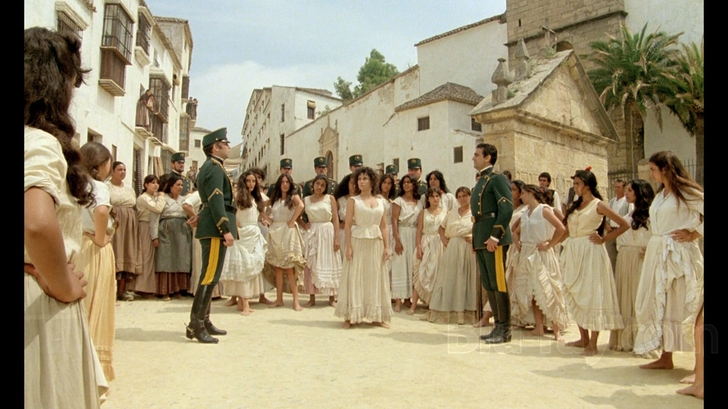
Carmen does the near impossible by making Bizet's "real life" yet patently "larger than life" characters fit perfectly within a filmic milieu, where the context of their time and culture is brought vividly alive. Rosi is a brilliant tightrope walker here, opening the film up enough to take advantage of the opportunities a cinematic treatment of the source material affords, but not overstuffing it with needless production elements that would detract from the passionate story of fatal attraction which is the opera's chief emotional calling card. The first rate cast is fantastic. This was the perfect time to catch Domingo playing Don José, his voice was beautifully mature, and he had obviously had enough experience with the role to bring out its tragic undercurrents. Migenes actually acts the part a bit better than she sings it, though her voice is certainly beautifully burnished as well, especially in its lower registers. While the film has some image issues, and the lack of a surround track on this US release is puzzling (not to mention a complete lack of supplements), this Carmen is certainly something to be celebrated, though PETA members might want to skip the opening credits sequence which is very, very disturbing. Recommended.
Similar titles
Similar titles you might also like
(Still not reliable for this title)

A Star Is Born
2018

Prey for Rock & Roll
2003

Cadillac Records
2008

We Are Your Friends
2015

Lady Sings the Blues
1972

Glitter
2001

Teen Spirit
2018

The Mambo Kings
1992

The Rose
1979

The Fabulous Baker Boys
MVD Marquee Collection
1989

9 Songs
2004

Saturday Night Fever 4K
45 Year Anniversary | Theatrical Cut / Director's Cut on standard Blu-ray
1977

Her Smell
2018

Jailhouse Rock
1957

8 Mile 4K
20th Anniversary Edition
2002

Purple Rain 4K
40th Anniversary
1984

Rudderless
2014

Bee Gees: One Night Only
1997

Bird
1988

The Buddy Holly Story
Limited Edition to 3000 - SOLD OUT
1978
